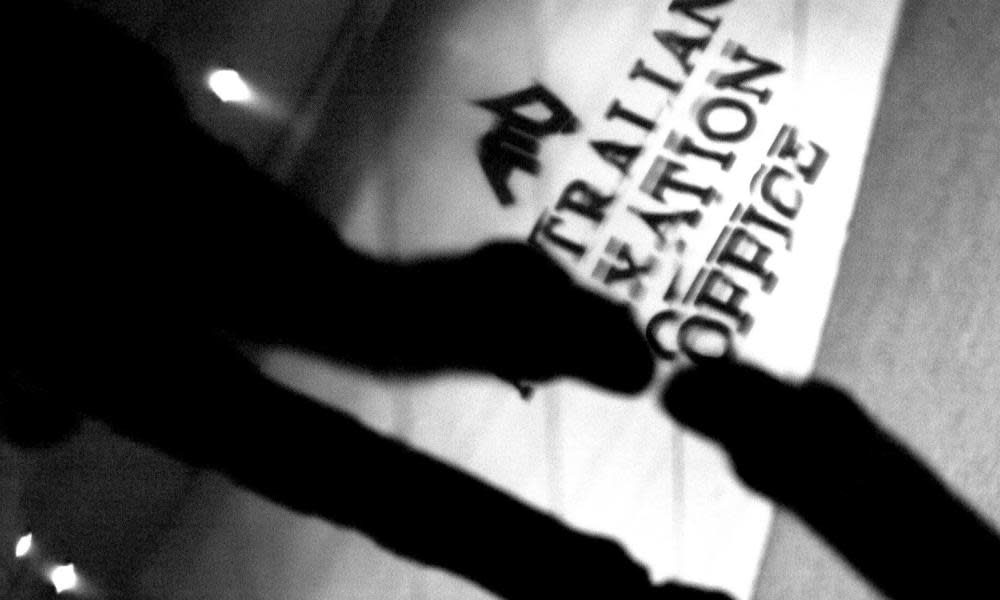Australian economy losing billions due to companies deliberately going broke, PwC finds

Phoenixing by companies that deliberately go broke has a direct cost of up to $5bn a year on business, employees and government, including a whopping $3bn owed to other businesses, a PwC report says.
Phoenixing is the deliberate and systematic liquidation of a company to avoid liabilities such as tax and employee entitlements then restarting the business to continue making a profit through separate trading entities.
The estimates are contained in a PwC report, to be released on Monday, along with an announcement from the minister for revenue and services, Kelly O’Dwyer, that the tax office has audited 340 businesses for involvement in phoenix activity in the last financial year, resulting in it issuing tax bills of $270m.
The PwC report estimated that in 2015-16 phoenixing cost the Australian economy between $2.9bn and $5.1bn, including $1.7bn owed to the government in unpaid taxes and compliance costs and up to $3.2bn owed to unpaid trade creditors.
Employees were left with unpaid entitlements estimated to cost up to $300m, although much of the unpaid wage bill is left to taxpayers who have forked out $1.6bn over 10 years to employees of failed companies.
PwC estimated that the overall economy-wide impact of phoenixing was between $1.8bn and $3.5bn of lost gross domestic product, or 0.11% to 0.21% of GDP in 2015-16.
The report said that illegal phoenix behaviour “can act like a ‘tax’ on victims because money is spent” but goods and services are not received and workers who miss out on entitlements have less money for consumption.
The estimated total impact to household consumption as a result of potential illegal phoenix activity is between $1.20bn and $2.36bn, it said.
“Successfully combating potential illegal phoenix activity in a cost-effective manner could provide a significant boost to the Australian economy,” the report concluded.
PwC did not estimate how many directors had engaged in phoenixing activities. In November Guardian Australia revealed that 1,322 people, who were each directors of two or more companies that failed, were responsible for a quarter of the unpaid wage bill picked up by taxpayers through the fair entitlement guarantee, a total of $400m.
The PwC report said more than 1 million businesses ceased operating during the financial years 2012-13 to 2015-16, and 36,532 business failures resulted in insolvency with an external administrator appointed.
“In most cases, these may have been legitimate and honest commercial failures; in other cases these failures may have been deliberate,” the report said.
PwC said it did not capture other direct effects including:
stress on employees
the discouragement of workers from participating in the labour market
the social welfare burden through increased government transfers, and
the distortionary competition effects on lawful businesses if their competitors were able to cut costs by not meeting legal obligations.
O’Dwyer said phoenixing “hurts hardworking Australians, including the company’s employees, suppliers, customers and competing businesses” and causes a “significant drain” on the Australian economy.
O’Dwyer said the government would set up a hotline to the tax office to “make it easier to report suspected phoenixing behaviour”.
Other elements of the crackdown include a policy to introduce a director identification number scheme, new phoenix offences, and new penalties for misuse of the unpaid wage safety net, the fair entitlement guarantee.
The shadow assistant treasurer, Andrew Leigh, criticised the government for re-announcing a hotline first proposed in September and failing to introduce legislation to create a director identification number to crack down on phoenixing.
“Australians need action – not announcements – on dodgy phoenix activity,” he said.
Labor first proposed an identification number for directors and has also called for higher penalties for phoenix activities and a new legal test for transactions depriving employees of their entitlements.

 Yahoo News
Yahoo News 
